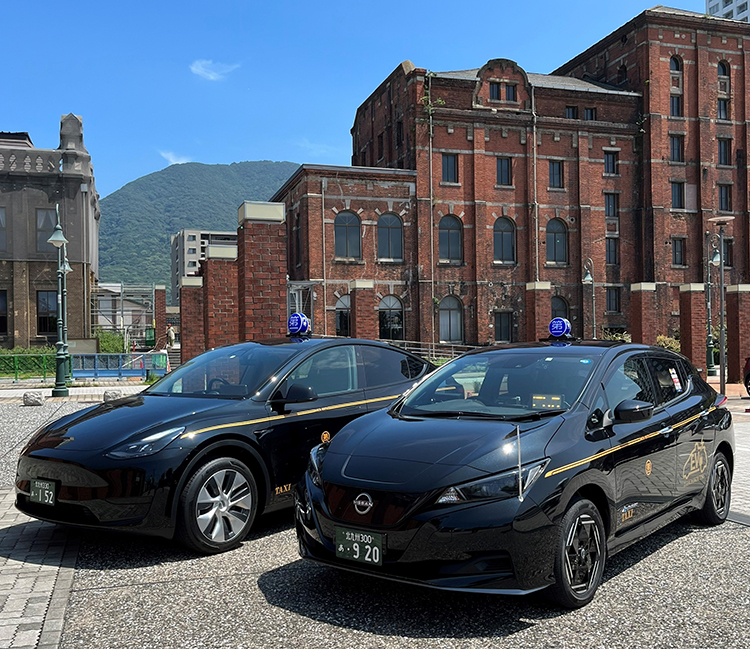Renewables-driven Next-generation Electric Vehicle Taxi Business Launched in Fukuoka Prefecture
July 31, 2023
Daiichi Koutsu Sangyo Co.,Ltd.
Mitsubishi Auto Leasing Corporation
Mitsubishi Corporation
Mitsubishi Auto Leasing Corporation
Mitsubishi Corporation
Daiichi Koutsu Sangyo Co., Ltd. (DKS), Mitsubishi Auto Leasing Corporation (MAL), and Mitsubishi Corporation (MC) are pleased to announce that we have commenced operations of a next-generation taxi business in Japan’s Fukuoka Prefecture. Running primarily from the Moji and Mojiko dispatch centers of DKS subsidiary Kitakyushu Daiichi Koutsu (KDK), this new taxi business will involve the use of large electric vehicle fleets, solar-power equipment and a energy-management system. It has been developed to help improve local transportation services and decarbonize the taxi industry.

There is a pressing need to electrify Japan’s taxis, partly due to the diminishing number of service stations that can provide the liquefied petroleum gas to run current fleets, but also because of the government’s 2030 goal to cut CO2 emissions from the country’s transportation sector by 35% (compared to 2013 levels).
To respond to this need, our companies shall be introducing the aforementioned electric vehicles (EVs) and equipment in stages to KDK’s Moji and Mojiko dispatch centers. The former will receive 12 EVs, recharging stations, a solar-power-generation system and an energy-management system, while the latter will receive six EVs and recharging stations. Up to now, there have been efforts in Japan’s taxi industry to introduce EVs, however, they have been relatively small-scale operations involving just a few vehicles. Our project is unique in that its objective is to create a management model for large EV fleets that can be used at different dispatch centers. Our activities at the Moji center will be particularly extensive, encompassing work to maximize the use of solar power and otherwise further reduce the center’s carbon footprint and operating costs. We also hope to make the center more resilient to power outages and other problems resulting from natural disasters.
In addition, the project will involve delivering EVs to three select members of “No. 1 Taxi,”1 Japan’s largest taxi network spanning roughly 700 companies and 40,000 vehicles. Both the Hikari2 and Hinomaru3 taxi companies will be among those EV recipients. Through this project, we shall endeavor to build a model for introducing EVs that is adaptable to the diverse operating conditions in Japan’s taxi industry.
The ultimate goal of our three companies is to use this project as a springboard to promote electrification of the Japanese taxi industry. Acknowledging the vital role it plays in local public transit, DKS shall use this opportunity to further develop and decarbonize its taxi operations, while MAL and MC plan to marry their respective resources and expertise in ways that can help to reduce the collective carbon footprint of Japan’s mobility industries. Their work on rolling out the EVs and their related equipment and services will take advantage of MAL’s comprehensive EV solutions, which include both EV leasing and maintenance services, and MC’s value-chain operations and mobility services, which cover the movement of both goods and people.
1. A large network connecting the DKS Group and its taxi affiliates. In addition to facilitating ticket interoperability and assisting with dispatching, the network supports its member companies by connecting them with businesses that provide services related to the taxi industry, procuring equipment, sharing information and otherwise helping to rejuvenate regional transportation.
2. A taxi company located in Kitakyushu City, Fukuoka Prefecture, providing general-taxi, charter-taxi, Kitakyushu-airport flat-rate taxi, excursion-taxi, Edamitsu Yamasaka shared-ride-bus, and other services.
3. A taxi company located in Ibara City, Okayama Prefecture, providing general-taxi, welfare-taxi, sightseeing-taxi, charter- and sightseeing-bus services.
<About us>
Daiichi Koutsu Sangyo Co., Ltd.
Head Office:2-6-8 Bashaku, Kokurakita-ku, Kitakyushu-shi, Fukuoka, Japan
Representative:Ryoichiro Tanaka, Representative Director, President and Chief Executive Officer
Date Established:September 1964
Main Operations:Founded with five taxies, DKS now operates a fleet of more than 8,000 taxies in 34 prefectures. In addition to the taxi business, DKS is developing community-based businesses as a comprehensive lifestyle industry, including real estate, nursing care and welfare, finance, bus services in Okinawa, and high-speed boats.
Mitsubishi Auto Leasing Corporation
Head Office:5-34-7 Shiba, Minato-ku, Tokyo
Representative:Satoru Nakano, Representative Director, President and Chief Executive Officer
Date Established:January 27, 1972
Main Operations:MAL provides comprehensive solution services including automobile leasing and maintenance. More recently, MAL has been developing solutions to support customers' efforts to decarbonize through the use of EVs.
Mitsubishi Corporation
Head Office:3-1, Marunouchi 2-Chome, Chiyoda-ku, Tokyo, 100-8086, Japan
Representative:Katsuya Nakanishi, Representative Director, President and Chief Executive Officer
Date Established:July 1, 1954 (Date Registered April 1, 1950)
Main Operations:MC engages in a wide range of businesses spanning multiple industries and overseen by its Industry DX Group, Next-Generation Energy Business Group and 10 Business Groups: Natural Gas, Industrial Materials, Chemicals Solution, Mineral Resources, Industrial Infrastructure, Automotive & Mobility, Food Industry, Consumer Industry, Power Solution, and Urban Development.
Materiality
Based on the Three Corporate Principles, which serve as MC’s core philosophy, MC has continued to grow together with society by contributing to the sustainable development of society through its business activities while pursuing value creation. MC’s revised “Materiality” was announced in Midterm Corporate Strategy 2024 as a set of crucial societal issues that MC will prioritize through its business activities, towards the strategy’s goal of continuous creation of MC Shared Value (MCSV). Guided by this Materiality, MC will continue to strengthen its efforts towards sustainable corporate growth. Out of the six material issues relating to “Realizing a Carbon Neutral Society and Striving to Enrich Society Both Materially and Spiritually”, this project’s activities particularly support “Contributing to Decarbonized Societies” and “Addressing Regional Issues and Growing Together with Local Communities”.

Inquiry Recipient
Mitsubishi CorporationTelephone:+81-3-3210-2171